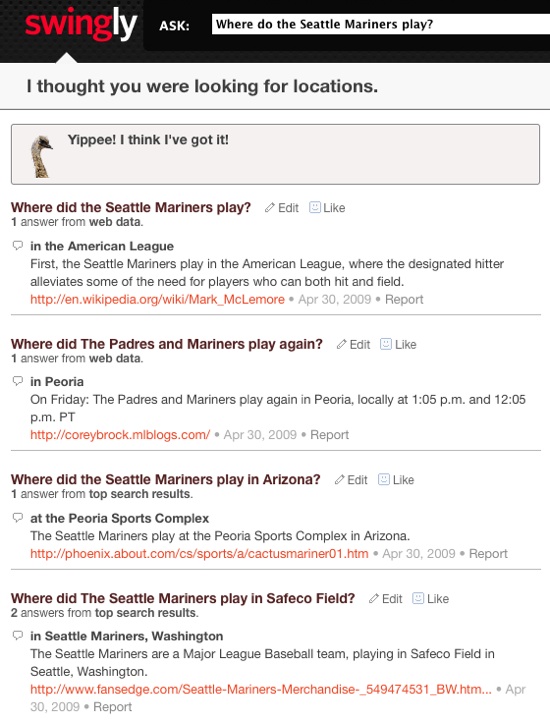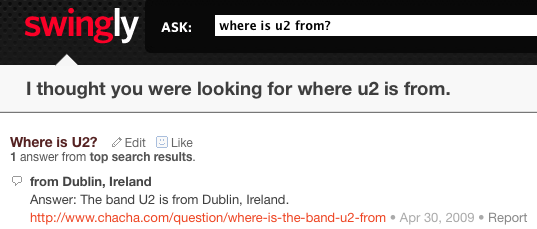Swingly: New Search Engine Reveals Just The Facts
The days of search engines merely being a middle man are over. Search isn’t about sending users to the right web page, it’s about getting them the information they want as soon as possible — sometimes it’s a web page, but it might also be a sports score, movie showtimes, election information, or some other […]
The days of search engines merely being a middle man are over. Search isn’t about sending users to the right web page, it’s about getting them the information they want as soon as possible — sometimes it’s a web page, but it might also be a sports score, movie showtimes, election information, or some other piece of information.
The latter — factual pieces of information — is where Swingly comes in.
The site, which has been tested by a couple hundred beta users so far, is now going into its public beta phase and invites are being shared more liberally. (In fact, we have some to give away at the end of this article.)
What Is Swingly?

If anything, Swingly is probably closest to what Ask.com was and wants to be again — an enormous repository of searchable questions and answers. Last month, Ask.com said that it has 500 million Q&A “pairs;” in a call last week, Swingly CEO Andy Hickl told me that he has more than 100 billion pairs indexed from across the web.
“We want to demonstrate that there’s a role for machines in social Q&A,” Hickl says. “The answers are out there. We want to index them.”
How Swingly Works
Swingly has been crawling the web, adding semantic information to the text it finds to piece together facts and the questions those facts answer. (It’s been crawling the competition, too, as some of the screenshots below show.) It performs well, Hickl says, when you approach Swingly like a buddy. “We do best when you ask well-formed, natural language questions, like you’d ask a friend. You wouldn’t talk to a friend with a bunch of keywords.”
For some questions, Swingly not only provides a list of matching answers/facts, but also fills the right-side column with additional information about the subject of your search. For other questions, Swingly is showing ads in the right from Google’s AdSense program. Hickl says Swingly may also monetize with paid answers to complement the organic results from its database.
While Swingly is heavily machine-driven, there are human elements at play, too. Users can provide feedback via a few small links next to each search result:
- Edit – users can submit additional questions that are answered by the facts Swingly displays
- Like – lets users indicate good answers
- Report – lets users flag answers
(If Swingly grows too quickly, the amount of user-generated feedback/content could become a problem. Hickl says the site currently has only 2.5 full-time employees.)
Swingly’s Strengths & Weaknesses
Swingly performs best when you search for facts — like Who, What, and When. It seems to do okay with some Where questions, but not with others. (More on that below.) You wouldn’t ask Swingly for opinion-based questions, like “What’s the best steakhouse in Seattle?” But, a question like “What was the first video on MTV?” is right up Swingly’s alley.
You also shouldn’t expect Swingly to answer “Why” questions — these require an interpretation of the facts. A question similar to the above, “Why are The Buggles important in music history?” doesn’t have any results.
Swingly does well with specific date-related questions, like “When did Safeco Field open?” This is a great answer, exactly what you’d be looking for:
But “Where” questions can be hit-and-miss. The ambiguity of language means that Swingly struggles if you ask something that has multiple correct answers, like “Where do the Seattle Mariners play?”
All of those answers are correct; they do play “in” the American League, and they do play spring training games in Peoria, Arizona. But the user is probably looking for the fourth answer down, Safeco Field. On the other hand, ask “Where is U2 from?” and Swingly nails it.
Just as human-powered Q&A engines are only as good/smart as the people answering questions, Swingly and other machine-powered fact engines are only as good as the web pages they crawl. And, in some cases, the facts on web pages might be wrong or outdated.
Swingly says the Yankees have won 26 World Series, and cites multiple web pages for that answer. But MLB.com says they’ve won 27 World Series, the most recent one happening last fall.
And, for what it’s worth, WikiAnswers also got it correct.
Final Thoughts
Despite the number of Q&A sites already available, I think there’s room for Swingly to carve out some space for itself in this field. It has room to improve, but is already pretty well-developed for an unfinished product.
If you’d like to try it out, sign up for the public beta at beta.swingly.com. You’ll be asked to create an account with your Google, Yahoo, Facebook, or OpenID account. We’re told that, if you enter
SearchEngineLand
as your invite code, you’ll be fast-tracked to get an invite. And yes, it’s case-sensitive and should be typed exactly as shown above.
Opinions expressed in this article are those of the guest author and not necessarily Search Engine Land. Staff authors are listed here.
Related stories
New on Search Engine Land







